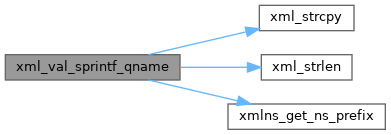 |
yumapro
25.10-4
YumaPro SDK
|
 |
yumapro
25.10-4
YumaPro SDK
|
Older XML utilities to make low-level data structures Most high level functions can use val_util APIs instead. More...

Functions | |
| xmlChar * | xml_val_make_qname (xmlns_id_t nsid, const xmlChar *name) |
| Make a Q-name string. More... | |
| uint32 | xml_val_qname_len (xmlns_id_t nsid, const xmlChar *name) |
| Determine the length of the qname string that would be generated with the xml_val_make_qname function. More... | |
| uint32 | xml_val_sprintf_qname (xmlChar *buff, uint32 bufflen, xmlns_id_t nsid, const xmlChar *name) |
| construct a QName into a buffer More... | |
| status_t | xml_val_add_attr (const xmlChar *name, xmlns_id_t nsid, xmlChar *attrval, val_value_t *val) |
| Set up a new attr val and add it to the specified val hand off a malloced attribute string. More... | |
| status_t | xml_val_add_cattr (const xmlChar *name, xmlns_id_t nsid, const xmlChar *cattrval, val_value_t *val) |
| Set up a new attr val and add it to the specified val const version copies string. More... | |
| val_value_t * | xml_val_new_struct (const xmlChar *name, xmlns_id_t nsid) |
| Set up a new generic struct. More... | |
| val_value_t * | xml_val_new_struct2 (const xmlChar *name, xmlns_id_t nsid) |
| Set up a new generic struct; copy the name. More... | |
| val_value_t * | xml_val_new_root (const xmlChar *name, xmlns_id_t nsid) |
| Set up a new struct as an ncx:root. More... | |
| val_value_t * | xml_val_new_string (const xmlChar *name, xmlns_id_t nsid, xmlChar *strval) |
| Set up a new string element; reuse the value instead of copying it hand off a malloced string. More... | |
| val_value_t * | xml_val_new_cstring (const xmlChar *name, xmlns_id_t nsid, const xmlChar *strval) |
| Set up a new string from a const string copy a const string. More... | |
| val_value_t * | xml_val_new_cstring2 (const xmlChar *name, xmlns_id_t nsid, const xmlChar *strval) |
| Set up a new string from a const string copy a const string; malloc the name! More... | |
| val_value_t * | xml_val_new_leaflist_string (const xmlChar *name, xmlns_id_t nsid, xmlChar *strval) |
| Set up a new string element; reuse the value instead of copying it hand off a malloced string. More... | |
| val_value_t * | xml_val_new_flag (const xmlChar *name, xmlns_id_t nsid) |
| Set up a new flag (NCX_NT_EMPTY) More... | |
| val_value_t * | xml_val_new_flag2 (const xmlChar *name, xmlns_id_t nsid) |
| Set up a new flag; malloc name! More... | |
| val_value_t * | xml_val_new_boolean (const xmlChar *name, xmlns_id_t nsid, boolean boo) |
| Set up a new boolean. More... | |
| val_value_t * | xml_val_new_number (const xmlChar *name, xmlns_id_t nsid, ncx_num_t *num, ncx_btype_t btyp) |
| Set up a new number. More... | |
Older XML utilities to make low-level data structures Most high level functions can use val_util APIs instead.
| status_t xml_val_add_attr | ( | const xmlChar * | name, |
| xmlns_id_t | nsid, | ||
| xmlChar * | attrval, | ||
| val_value_t * | val | ||
| ) |
Set up a new attr val and add it to the specified val hand off a malloced attribute string.
| name | attr name |
| nsid | namespace ID of attr |
| attrval | attr val to add (do not use strdup) |
| val | parent val struct to hold the new attr |


| status_t xml_val_add_cattr | ( | const xmlChar * | name, |
| xmlns_id_t | nsid, | ||
| const xmlChar * | cattrval, | ||
| val_value_t * | val | ||
| ) |
Set up a new attr val and add it to the specified val const version copies string.
| name | attr name |
| nsid | namespace ID of attr |
| cattrval | attr val to copy |
| val | parent val struct to hold the new attr |

| xmlChar * xml_val_make_qname | ( | xmlns_id_t | nsid, |
| const xmlChar * | name | ||
| ) |
Make a Q-name string.
Build output value: add child node to a struct node Malloc a string buffer and create a QName string This is complete; The m__free function must be called with the return value if it is non-NULL;
| nsid | namespace ID to use |
| name | string |
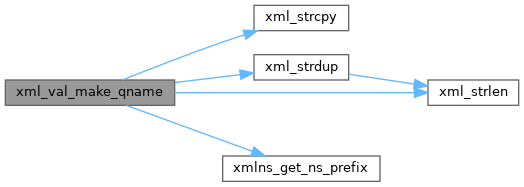
| val_value_t * xml_val_new_boolean | ( | const xmlChar * | name, |
| xmlns_id_t | nsid, | ||
| boolean | boo | ||
| ) |
Set up a new boolean.
DO NOT USE IN SIL OR SIL-SA CODE This function uses generic objects. YANG data should be created using the correct obj_template_t for the specific subtree
| name | element name |
| nsid | namespace ID of name |
| boo | boolean value to set |

| val_value_t * xml_val_new_cstring | ( | const xmlChar * | name, |
| xmlns_id_t | nsid, | ||
| const xmlChar * | strval | ||
| ) |
Set up a new string from a const string copy a const string.
DO NOT USE IN SIL OR SIL-SA CODE This function uses generic objects. YANG data should be created using the correct obj_template_t for the specific subtree
| name | element name |
| nsid | namespace ID of name |
| strval | const string to clone for the value node |

| val_value_t * xml_val_new_cstring2 | ( | const xmlChar * | name, |
| xmlns_id_t | nsid, | ||
| const xmlChar * | strval | ||
| ) |
Set up a new string from a const string copy a const string; malloc the name!
DO NOT USE IN SIL OR SIL-SA CODE This function uses generic objects. YANG data should be created using the correct obj_template_t for the specific subtree
| name | element name |
| nsid | namespace ID of name |
| strval | const string to clone for the value node |
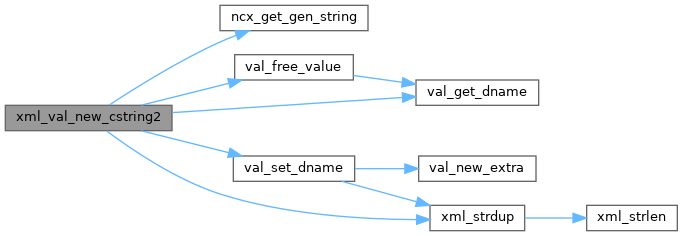
| val_value_t * xml_val_new_flag | ( | const xmlChar * | name, |
| xmlns_id_t | nsid | ||
| ) |
Set up a new flag (NCX_NT_EMPTY)
DO NOT USE IN SIL OR SIL-SA CODE This function uses generic objects. YANG data should be created using the correct obj_template_t for the specific subtree
| name | element name |
| nsid | namespace ID of name |
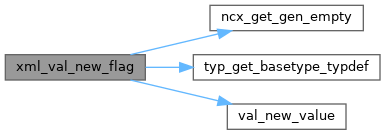

| val_value_t * xml_val_new_flag2 | ( | const xmlChar * | name, |
| xmlns_id_t | nsid | ||
| ) |
Set up a new flag; malloc name!
DO NOT USE IN SIL OR SIL-SA CODE This function uses generic objects. YANG data should be created using the correct obj_template_t for the specific subtree
| name | element name |
| nsid | namespace ID of name |
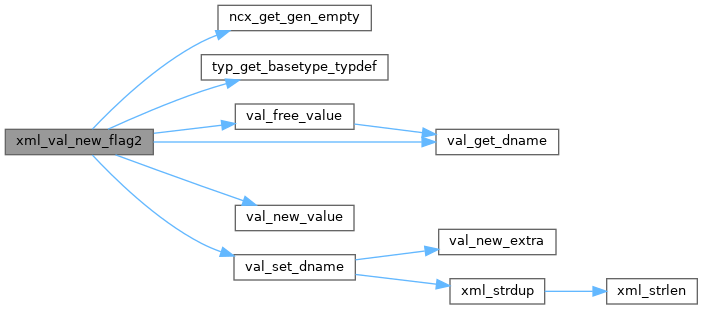
| val_value_t * xml_val_new_leaflist_string | ( | const xmlChar * | name, |
| xmlns_id_t | nsid, | ||
| xmlChar * | strval | ||
| ) |
Set up a new string element; reuse the value instead of copying it hand off a malloced string.
DO NOT USE IN SIL OR SIL-SA CODE This function uses generic objects. YANG data should be created using the correct obj_template_t for the specific subtree
| name | element name |
| nsid | namespace ID of name |
| strval | malloced string to pass off to the data node |

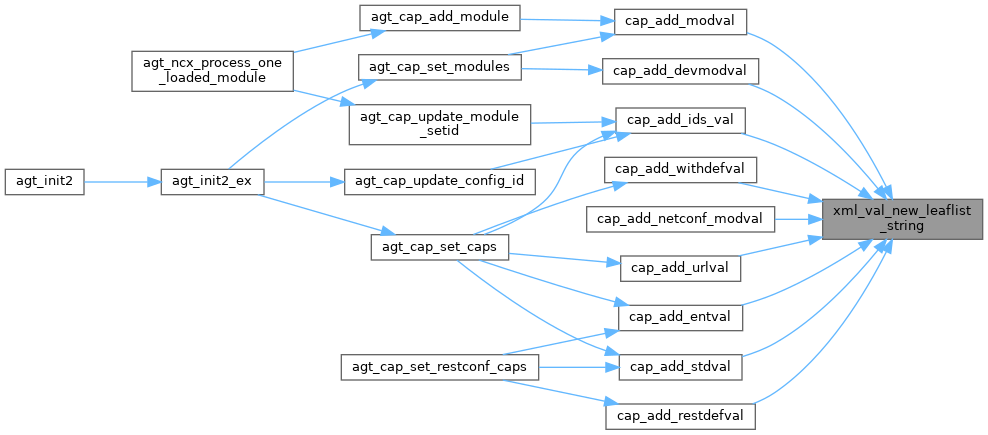
| val_value_t * xml_val_new_number | ( | const xmlChar * | name, |
| xmlns_id_t | nsid, | ||
| ncx_num_t * | num, | ||
| ncx_btype_t | btyp | ||
| ) |
Set up a new number.
DO NOT USE IN SIL OR SIL-SA CODE This function uses generic objects. YANG data should be created using the correct obj_template_t for the specific subtree
| name | element name |
| nsid | namespace ID of name |
| num | number value to set |
| btyp | base type of 'num' |
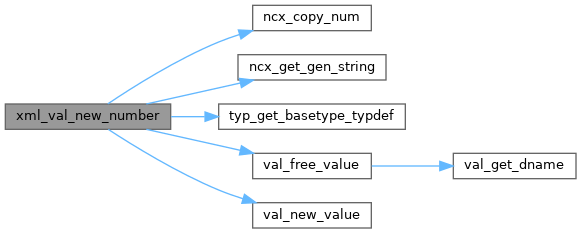
| val_value_t * xml_val_new_root | ( | const xmlChar * | name, |
| xmlns_id_t | nsid | ||
| ) |
Set up a new struct as an ncx:root.
DO NOT USE IN SIL OR SIL-SA CODE This function uses generic objects. YANG data should be created using the correct obj_template_t for the specific subtree
| name | element name |
| nsid | namespace ID of name |

| val_value_t * xml_val_new_string | ( | const xmlChar * | name, |
| xmlns_id_t | nsid, | ||
| xmlChar * | strval | ||
| ) |
Set up a new string element; reuse the value instead of copying it hand off a malloced string.
DO NOT USE IN SIL OR SIL-SA CODE This function uses generic objects. YANG data should be created using the correct obj_template_t for the specific subtree
| name | element name |
| nsid | namespace ID of name |
| strval | malloced string to pass off to the data node |

| val_value_t * xml_val_new_struct | ( | const xmlChar * | name, |
| xmlns_id_t | nsid | ||
| ) |
Set up a new generic struct.
Do not use this for SIL or SIL-SA code. This will use the generic objects which can cause elements to be printed out of order
| name | element name |
| nsid | namespace ID of name |


| val_value_t * xml_val_new_struct2 | ( | const xmlChar * | name, |
| xmlns_id_t | nsid | ||
| ) |
Set up a new generic struct; copy the name.
Do not use this for SIL or SIL-SA code. This will use the generic objects which can cause elements to be printed out of order
| name | element name |
| nsid | namespace ID of name |
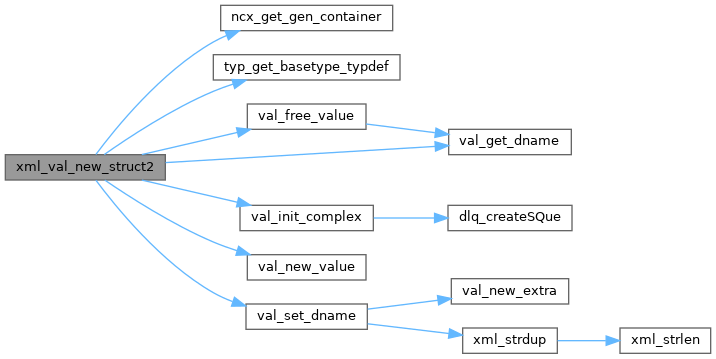
| uint32 xml_val_qname_len | ( | xmlns_id_t | nsid, |
| const xmlChar * | name | ||
| ) |
Determine the length of the qname string that would be generated with the xml_val_make_qname function.
| nsid | namespace ID to use |
| name | condition clause (may be NULL) |

| uint32 xml_val_sprintf_qname | ( | xmlChar * | buff, |
| uint32 | bufflen, | ||
| xmlns_id_t | nsid, | ||
| const xmlChar * | name | ||
| ) |
construct a QName into a buffer
| buff | buffer to use for output |
| bufflen | size of buffer |
| nsid | namespace ID to use |
| name | == name string |
